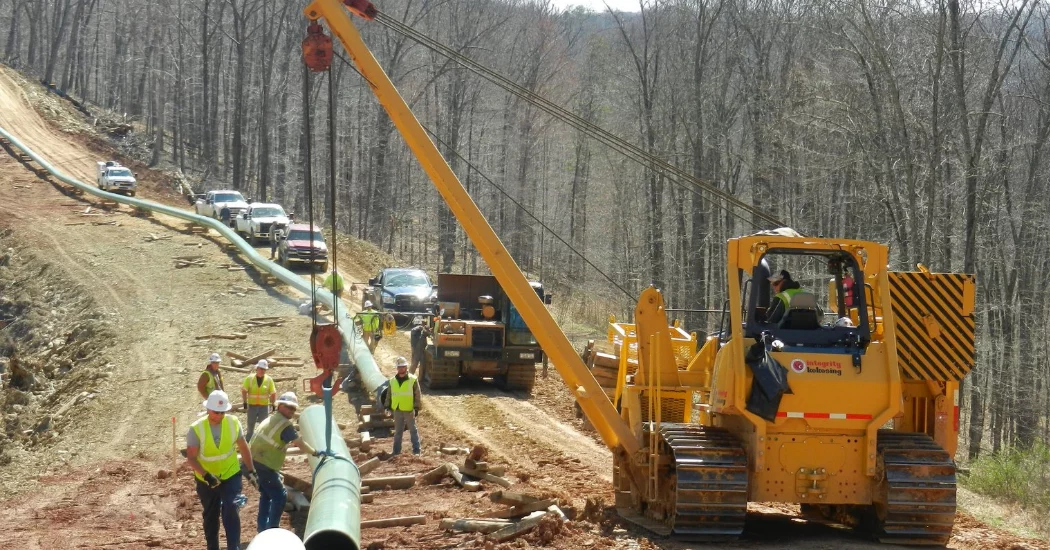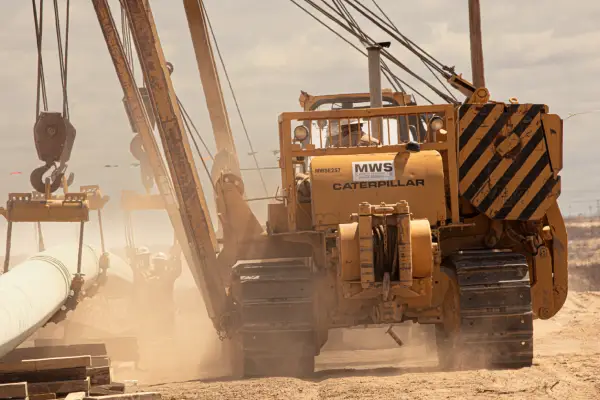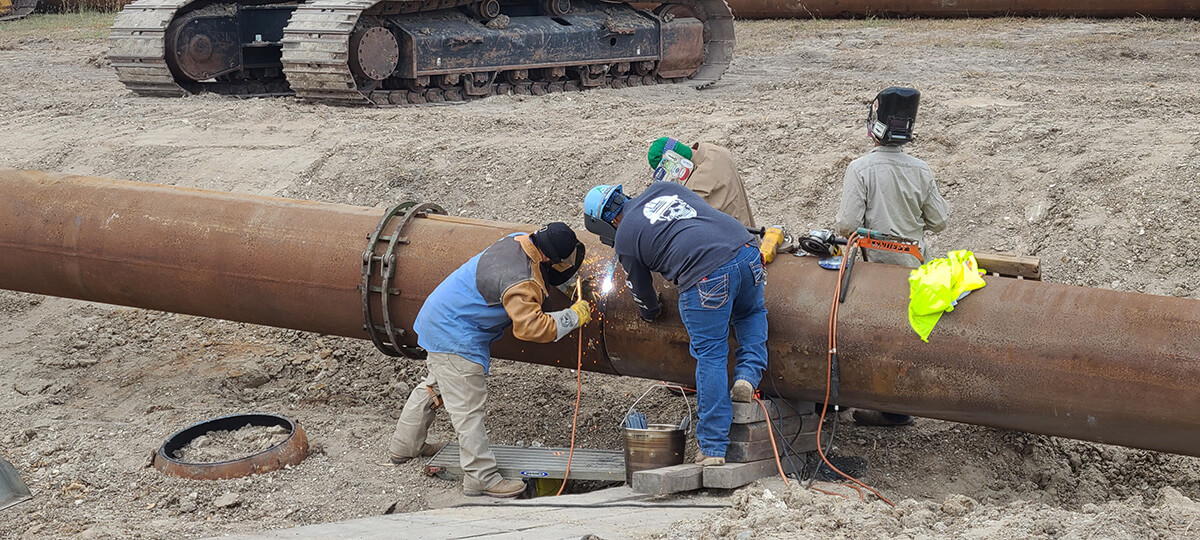The Vital Overview to Comprehending Pipeline Construction Services and Their Importance
Pipeline Construction services are fundamental to the transport of vital sources such as water, oil, and gas. These services include thorough preparation and execution, sticking to rigid safety and security and ecological standards. As the market adapts to contemporary challenges, comprehending its parts and ramifications becomes progressively vital. What factors contribute to the growing significance of these solutions in today's economic situation? The adhering to areas will certainly discover these essential aspects.
Review of Pipeline Construction Providers
Pipeline Construction solutions incorporate a variety of tasks vital for the installment and upkeep of pipelines utilized to transfer different substances, consisting of gas, water, and oil. These solutions are important for guaranteeing the reliable and safe activity of sources from one location to another. The procedure normally begins with complete preparation and layout, which takes right into account governing demands, environmental factors to consider, and logistical challenges.
When planning is total, excavation and grading of the land are carried out to prepare the website for Pipeline setup. This is complied with by the real laying of the pipelines, which entails welding or joining sections with each other to develop a continuous circulation course. After installation, strenuous testing is done to assure stability and security. Upkeep solutions are additionally supplied to address any type of problems that might develop gradually. In general, Pipeline Construction solutions play an essential duty in sustaining facilities for power and water distribution.
Trick Parts of Pipeline Construction
A successful Pipeline Construction task depends on numerous essential parts that assure the reliable and secure setup of the Pipeline system. First, thorough website assessments are important, as they recognize the geographical and ecological factors that might affect Construction. Next, the option of proper products, such as installations and pipelines, is essential for securing sturdiness and compatibility with the carried compounds.
Moreover, advanced Construction strategies, including trenchless technology and directional boring, improve performance and lessen ecological influence. Reliable project monitoring is one more essential component, working with labor, equipment, and timelines to satisfy task goals.
In addition, communication among stakeholders, including designers, specialists, and regional authorities, assurances alignment on task requirements and needs. Finally, detailed high quality control measures throughout the Construction process guarantee conformity with industry criteria and make the most of the Pipeline's operational life expectancy. Collectively, these parts form the backbone of a successful Pipeline Construction job.
Safety Requirements and Rules in Pipeline Construction

Regulative bodies, such as the Occupational Security and Wellness Administration (OSHA) and the Pipeline and Hazardous Products Safety Management (PHMSA), stated details demands that regulate Construction techniques. These include procedures for tools usage, worker training, and emergency situation action procedures. By applying these standards, Construction companies not just safeguard their staff members but likewise safe and secure public depend on. Inevitably, extensive security steps add to the long-lasting success of Pipeline tasks, ensuring they fulfill both functional and ecological expectations.
Environmental Factors To Consider in Pipeline Projects

Environmental factors to consider are indispensable to the planning and implementation of Pipeline projects. These jobs should evaluate prospective effect on environments, water resources, and neighborhood wildlife. Carrying out complete ecological influence analyses (EIAs) is important, allowing stakeholders to identify and mitigate dangers prior to Construction begins.
Shielding sensitive locations, such as environments and wetlands, typically calls for implementing details design functions or alternative transmitting to reduce disturbance. Additionally, Pipeline operators are charged with creating techniques for protecting against spills and leakages, which can have destructive results on the setting.
Interaction with regional areas is vital, as public problems can lead to project modifications that boost environmental management. Compliance with regulations set by environmental firms assures that jobs satisfy sustainability criteria, cultivating an equilibrium in between infrastructure needs and environmental preservation. Eventually, addressing ecological factors to consider not only safeguards nature yet likewise promotes neighborhood depend on and task stability.
The Role of Technology in Pipeline Construction
Technology plays a vital role in modern-day Pipeline Construction, boosting efficiency and accuracy. Advanced checking strategies enable accurate preparation and execution, lessening environmental influence and task delays. In addition, the assimilation of automation and robotics simplifies operations, decreasing labor prices and improving safety on Construction sites.
Advanced Evaluating Techniques
Advanced surveying methods play an essential function in the successful execution of Pipeline Construction tasks. These techniques take advantage of advanced modern technology to assure specific mapping and analysis of the surface where pipes will be installed. Techniques such as Geographic Info Systems (GIS), LiDAR (Light Detection and Ranging), and 3D modeling enable engineers to picture and assess the landscape, recognizing prospective obstacles and ecological concerns. By utilizing these innovative tools, groups can enhance precision in positioning and positioning, considerably minimizing the danger of mistakes throughout Construction. Furthermore, real-time data collection permits for instant changes and notified decision-making throughout the project lifecycle. Ultimately, these surveying advancements add to boosted efficiency, safety, and sustainability in Pipeline Construction efforts.
Automation and Robotics

Economic Impact of Pipeline Framework
Pipeline framework plays a vital role in helping with and forming local economic situations trade. By supplying a trustworthy means of carrying oil, gas, and various other products, pipelines decrease transportation expenses and boost supply chain performance. This facilities attracts financial investment, boosts task creation, and fosters economic growth in bordering areas.
Moreover, the Construction and upkeep of pipelines contribute substantially to local economic situations, producing various employment possibility in various sectors, from design to labor. The increase of work often causes boosted costs in local services, further strengthening economic activity.
In addition, pipes improve energy safety by ensuring a steady supply of sources, which is critical for residential needs and commercial operations. As areas end up being interconnected with Pipeline networks, they access to more comprehensive markets, increasing competition and economic strength. The financial effect of Pipeline infrastructure is diverse, influencing both prompt local economic situations and wider local development.
Future Patterns in Pipeline Construction Services
The future of Pipeline Construction services is evolving in feedback to technical innovations, regulatory changes, and expanding environmental factors to consider. Advancements such as robotics and drones are simplifying evaluation and upkeep procedures, enhancing security and performance. Automation is positioned to decrease labor expenses and boost precision in Construction operations. In addition, the boosting focus on sustainability is triggering firms to take on green materials and practices, straightening with worldwide efforts to decrease carbon impacts.
Regulatory structures are also adjusting to attend to environmental impacts, promoting higher openness and liability in Pipeline tasks. The combination of clever innovations, consisting of real-time tracking systems, is anticipated to enhance the integrity and efficiency of Pipeline networks. As energy needs change towards renewable sources, Pipeline Construction solutions will likely see a surge in projects connected to biofuels and hydrogen learn the facts here now transport. In general, these patterns suggest a transformative period for the Pipeline Construction industry, concentrated on development and sustainability.
Frequently Asked Concerns
What Types of Pipelines Are Frequently Created?
Numerous kinds of pipes are typically built, including oil, gas, sewer, and water pipes - Pipeline Construction Services. Each serves distinct purposes, helping with the transport of essential sources throughout areas while sticking to security and ecological laws
Exactly how Lengthy Does a Common Pipeline Job Take?
The duration of a typical Pipeline project differs significantly, usually ranging from numerous months to a few years. Aspects influencing this timeline include project intricacy, regulative approvals, and environmental factors to consider that should be resolved.
Who Regulates Pipeline Construction Business?
Pipeline Construction companies are regulated by different government, state, and regional firms, including the Pipeline and Hazardous Materials Safety And Security Administration (PHMSA) and state public energy compensations, making sure conformity with security and environmental criteria throughout the Construction procedure.
What Are Typical Products Made Use Of in Pipeline Construction?
Usual materials utilized in Pipeline Construction consist of pvc, steel, and polyethylene. Each product offers distinct benefits such as durability, versatility, and resistance to rust, making them suitable for different applications in transporting gases and liquids.

Exactly How Are Pipeline Construction Prices Estimated?
Pipeline Construction prices are approximated by assessing factors such as material expenses, labor prices, job complexity, environmental considerations, and governing needs (Pipeline Construction Services). Accurate cost estimation guarantees effective budgeting and job planning throughout the Construction process
Pipeline Construction services incorporate a range of activities crucial for the installment and maintenance of pipelines used to transfer various substances, including water, oil, and gas. An effective Pipeline Construction project depends on numerous essential parts that ensure the reliable and safe installation of the Pipeline system. Advanced checking methods play an important function in the successful implementation of Pipeline Construction jobs. Numerous types of pipes are commonly created, consisting of oil, water, sewer, and gas pipes. Pipeline Construction costs are estimated by analyzing variables such as material costs, labor prices, job intricacy, ecological factors to consider, and regulative demands.